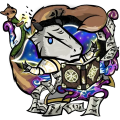It becomes easier to understand once you remember culture is not independent of biology - culture is byproduct of biology and environment. Humans paint with certain subset of colors because those are what our eyes can see; we make music using certain frequencies of sound because those are what our ears can hear; we communicate by sound because the structure of our lungs and throat allow for it; we can form language of those sounds because our nervous system is set up in a specific way, with flaw in
one gene enough to significantly reduce that ability. This extends to anything you could consider moral behaviour -
evolution and genetics of altruism, for example, are existing topics of study.
So it isn't particularly big leap to posit that someone's morally wrong behaviour is due to something being
biologically wrong with them. Again, we can already show this to be true to some extent within humans - for example,
anti-social disorder, associated with impulsive, manipulative, dishonest and violent behaviour, correlates with reduced grey matter in the frontal cortex and is estimated to be 50% genetic.
It's worth noting that the "beauty is good, ugliness is bad" trope is a primitive expression of the same idea. It's been theorized to stem from natural fear of infectious diseases. As in, people naturally think of moral evil in terms of sickness, and hence visible signs of natural evil (sickness) become perceived as signs of moral evil also. They can be further linked by belief that the visible physical illness is divine punishment for the invisible moral illness - relevant to fantasy games because in fantasy, it can be literally true.



 Re: Dwarves aren't cool anymore
Castlevania II: Dracula's Curse
Re: Dwarves aren't cool anymore
Castlevania II: Dracula's Curse



